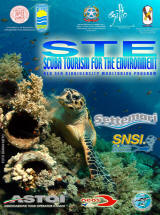ENVIRONMENTAL EDUCATION AND SUSTAINABILITY

This project stems from a 15-year collaboration between our research group and the Marine & Freshwater Science Group Association, with the aim of spreading environmental awareness among tourists. A responsible behavior towards the environment is particularly important with regard to the sustainability of tourism, which bases its economy on the wealth and beauty of natural resources.
Glocal Education environmental educators involve tourists in biology courses, and species identification exercises during sea and land excursions. The researchers will quantify the effect of the training courses on environmental awareness of the tourists involved and their behavior with regard to natural resources, helping to make tourism an economic and sustainable resource.
ENVIRONMENTAL MONITORING

Started on 2017, this research aims to assess the biodiversity degree of marine environments along the Mediterranean coasts, by considering the distribution of some organisms considered as indicators. Data are collected by recreational divers through the recording of a special questionnaire.
This research is the continuation of a previous survey (Divers for the Environment).
GO TO WEBSITE PROJECT
Closed projects

Human activities cause the loss of many plants and animals, and create “altered, unnatural” environments which appear biologically homogeneous, dominated only by a few resistant species. “Unaltered, natural” environments, instead, display a high degree of biological heterogeneity, since the host many animal and plant species which are in equilibrium. This research, started on 2006, has the aim of assessing the biodiversity of coral reefs along Red Sea coasts, and thus assess its healthy state. The data, since 2007, will be collected by underwater tourists by recording a special questionnaire. The first stage of the project was concluded on 2010, with more than 17500 questionnaires. The second stage, currently underway, will end up on 2014.
GO TO WEBSITE PROJECT

Human activities cause the loss of many plants and animals, and create “altered, unnatural” environments which appear biologically homogeneous, dominated only by a few resistant species. “Unaltered, natural” environments, instead, display a high degree of biological heterogeneity, since the host many animal and plant species which are in equilibrium. This research started on 2002, with the aim of assessing the biological divesity degree of marine environments along italian coasts, by considering the distribution of some organisms considered as indicators. Data were collected by recreational divers through the recording of a special questionnaire.
GO TO WEBSITE PROJECT

Started on 1999, it was the first research on the geographical and ecological distribution of Mediterranean seahorses. The aim of this research was to collect information on the quality of marine environment by using, instead of traditional chemical anlyses, which are expensive and limited, a biological indicator, which is a delicate organism who indicates a better or worse environmental quality depending on its presence or absence, respectively. The selected organism was the seahorse, Hippocampus hippocampus and Hippocampus ramulosus. Project results were published on the scientific journal Conservation Biology, published by the American Society of Conservation Biology.

